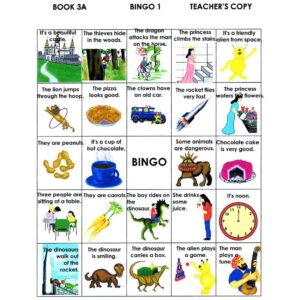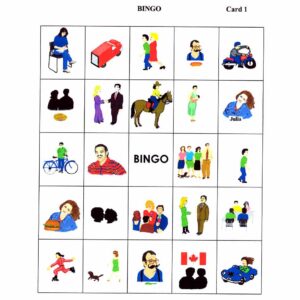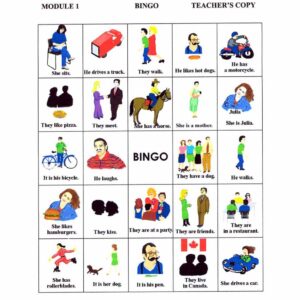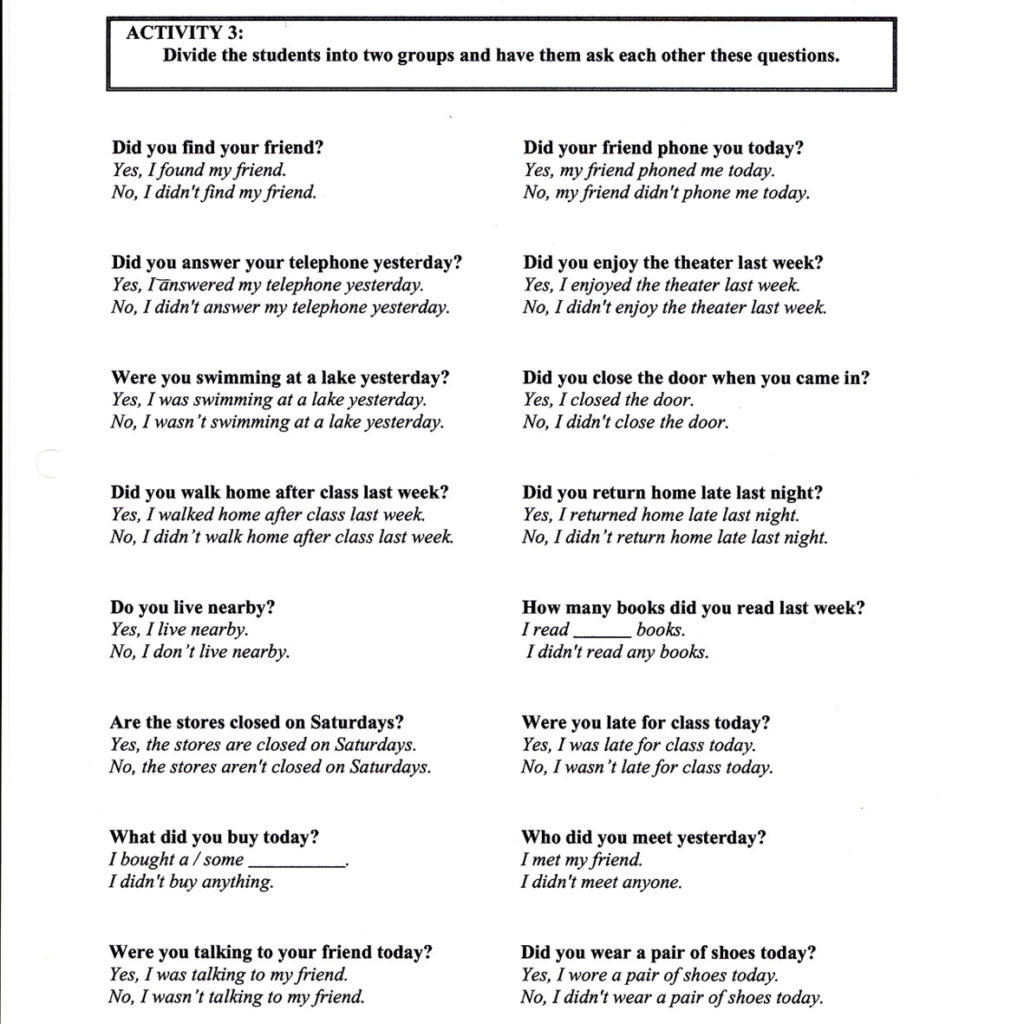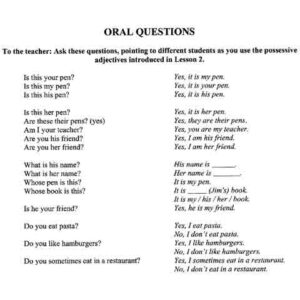Getting English Second Language Beginners Started with Our Curriculum
- Posted by Daisy Stocker
- Date September 27, 2014
- Comments 0 comment
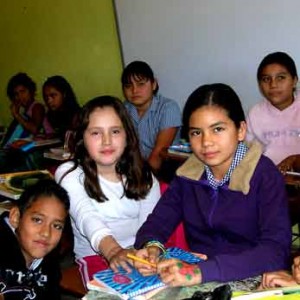
Getting Started
When beginning students enroll in an ESL class, they are likely to come in with quite a bit of anxiety. They want to learn English, but many of them will be worried that it will be too difficult, or that they will appear stupid in class. If the teacher can recognize this, and show the students a relaxed and caring atmosphere, the students will respond very well.The best way to obtain a relaxed atmosphere is through participation. When there is a lot of oral work, and when there is small group work, students soon see that they are all working together, and that it’s quite alright to make mistakes.
Let’s assume that the students entering a Beginner’s Class know the English alphabet, that is, they can name the letters and identify the vowels. They don’t, however, have any speaking or reading vocabulary. They want to learn to understand, speak, read, and write in English. Oral questions and group activities are an effective way to get everyone started.
How Can We Help Them to Make a Positive Start and Discover that Learning a Language Can Be Fun?
The most important concept to be stressed in any language program is that the students speak in complete sentences. Although learning a limited number of vocabulary words with each lesson is necessary, the students need to be using them in a variety of oral language situations. They need to be interacting with each other.
Over the years, we always found that students loved Bingo games. Students find this very relaxing and yet there is a lot of learning taking place. The first couple of games with a card can be difficult, so we let the students help each other. After that, they know what they are doing and enjoy it very much. With Picture and Word Bingo, it is best to use entire sentences in the captions. Without having to even mention it, the students are learning basic sentence structure every time they hear a caption.
Why teach English Using Complete Sentences?
Basically, a sentence contains all the elements of communication – vocabulary, grammar and meaning. It establishes the pattern for English sentences and the students hear the cadence of the language. When new vocabulary words are introduced it’s important that the students have many opportunities to use them throughout the series of lessons.
Oral Questions
When teaching our ESL Curriculum, we always ask oral questions. Each lesson has a list of ten to twenty oral questions, based upon the concepts of that lesson. This gives the teacher the opportunity to make personal one to one contact with each student. Students soon learn that the sky doesn’t fall if they make a mistake. The teacher can go to the board and write the correct answer if there is real difficulty. Certainly the teacher can know if one student is having difficulty with some point, there are likely others in the class with the same problem. Here again, all the questions and answers should be in complete sentences. Certainly, students can correctly answer with a simple “yes”, or “no”. We always point out that this is an English class, and that students need to practice by answering in complete sentences. In this way, students are constantly hearing correct sentences, with all of the grammatical elements and all of it in the correct word order. When we gave students surveys of all of the classroom activities, Oral Questions was always the most popular with all of our students.
Students in many countries have consistently rated ORAL QUESTIONS as the most helpful activity. During this whole class activity the teacher asks questions based on the material that has been introduced or perhaps is about to be introduced in the current lesson. The questions are asked randomly so that the students never know when their turn is coming. It’s great if the content is funny. For example the teacher can ask an outgoing macho guy: “Do you wear a dress?” or “Are you a mother?” Laughter is a very important part of learning.
Click to Enlarge
Divide into Groups
Another way to get them talking, listening and understanding is to divide the class into two groups. They can name their groups after their favorite sports team or whatever interests them. The two teams should sit facing each other. Give each student one or two questions with the answers.
Oral Questions for Small Groups
Example:
Are you an English student?
Yes, I’m an English student.
Print and cut the activity so that each student has one or two questions with the answers. When the students all have questions and answers, a student in Team 1 asks a student in Team 2 the question on his or her paper. If he or she answers correctly then the team gets a point. (This is optional depending on the preferences of the groups.) Next it’s the turn of Team 2 to ask the question and for someone in Team 1 to answer. Continue until every student has asked and answered one question. The students must ask someone who hasn’t answered at all, before asking anyone a second question.
Try this Activity with Your Beginners When You Think They Have Enough Vocabulary to Understand It.
Do you drink ________ juice?
Yes, I drink ________ juice.
No, I don’t drink ________ juice.
Are you cold?
Yes, I’m cold.
No, I’m not cold.
Are you Canadian?
Yes, I’m Canadian.
No, I’m not Canadian.
Are you an English student?
Yes, I’m an English student.
Do you have a dog?
Yes, I have a dog.
No, I don’t have a dog.
Do you drink juice?
Yes, I drink juice.
No, I don’t drink juice.
Are you thirsty?
Yes, I’m thirsty.
No, I’m not thirsty.
Do you have a friend?
Yes, I have a friend.
No, I don’t have a friend.
Do your friends drive cars?
Yes, my friends drive cars.
No, my friends don’t drive cars.
Are you a waitress?
Yes, I’m a waitress.
No, I’m not a waitress.
Do you like dogs?
Yes, I like dogs.
No, I don’t like dogs.
Is it hot today?
Yes, it’s hot today.
No, it’s not hot today.
Are you a teacher?
Yes, I’m a teacher.
No, I’m not a teacher.
Do you like hamburgers?
Yes, I like hamburgers.
No, I don’t like hamburgers.
Is it cold in your city?
Yes, it’s cold in our city.
No, it isn’t cold in our city.
Do you like cats?
Yes, I like cats.
No, I don’t like cats.
Do you like pizza?
Yes, I like pizza.
No, I don’t like pizza.
Do you have a car?
Yes, I have a car.
No, I don’t have a car.
Purchasing and Using a Complete ESL Curriculum
- Spending Less on Curriculum - Many of the countries of the world are facing difficult economic times. Radical changes are taking place each day as people struggle to earn enough to maintain their standard of …
- Using Your ESL Curriculum - ESL Adult Curriculum are available by the thousands. If you have already chosen a curriculum, in all probability it is satisfactory, but how the teacher uses it is the big question. …
- Getting English Second Language Beginners Started with Our Curriculum - When beginning students enroll in an ESL class, they are likely to come in with quite a bit of anxiety. They want to learn English, but many of them will …
- Tips on Choosing an ESL Curriculum - “Why, that’s easy”, you might say, “it is to teach English students to speak ” If that’s the case, why do so many programs fail? In Canada, most students took …
Date Modified: 2024-07-03
Daisy Stocker taught ESL in Eastern Europe for 10 years and was a primary school teacher in Canada for 30 years. Daisy has a B.A. and M Ed. in Education.
You may also like

Spending Less on Curriculum
Using Your ESL Curriculum
ESL Adult Curriculum are available by the thousands. If you have already chosen a curriculum, in all probability it is satisfactory, but how the teacher uses it is the big question. …
Tips on Choosing an ESL Curriculum
“Why, that’s easy”, you might say, “it is to teach English students to speak ” If that’s the case, why do so many programs fail? In Canada, most students took …

